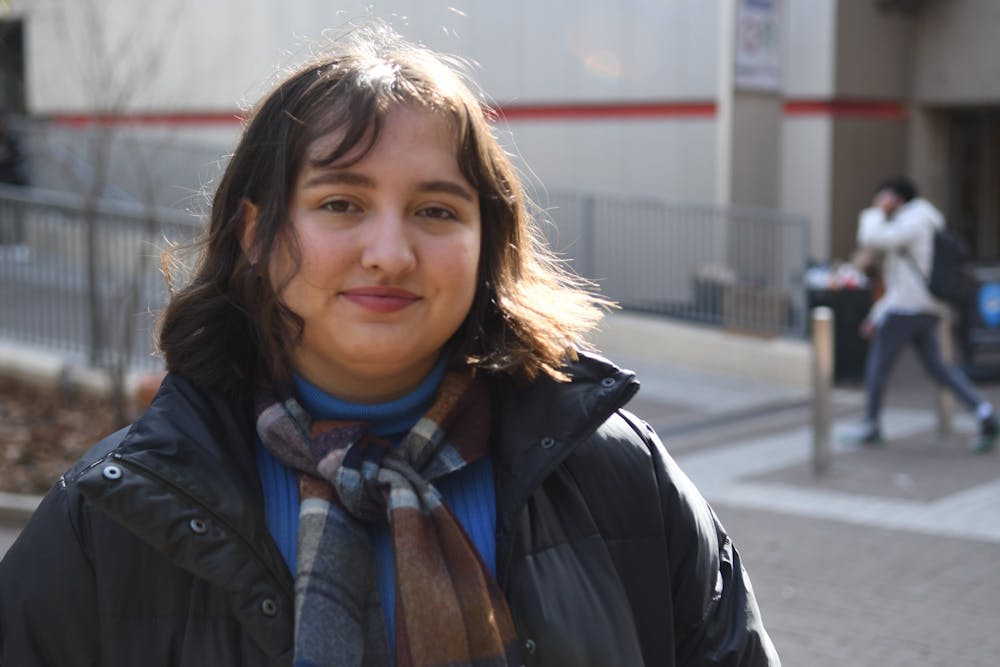As skateboarding and Slurpees turns to grief and darkness, the voice of a dead, missing girl retells the story of her own kidnapping. The story begins and ends with violence: the inherent violence of being socialized as a girl and the brutal ending of her short life.
Sof Sears (C '23) has written a variety of works—short stories, poetry, essays, plays—that use horror and monstrosity to deal with girlhood and feminism. Horror and gender are central themes in their work, and a lot of it comes from their own experience with gender. Their short fiction story “Roadkill” was inspired by the ethically murky realm of true crime. “Why are people so interested in true crime, and why has it become so popular with women especially, when they are often the victims of the stories?” Sof says. “That piece, it feels like everything was pent up, and it just kind of came out.”
Writing about gender is no easier than grappling with the institution itself. “It’s the same things that come out in my writing over and over again,” Sof says, “but just in different costumes.” A Gender, Sexuality, and Women's Studies major, Sof examines the world through a critical lens, finding that even the most mundane things can be gendered and marginalizing. A writer by both trade and thought, it’s natural that they view gender as a metaphor. “It’s like a knot or a thread, and you think you’re over it, but then you haven’t unraveled it yet," Sof says. "It’s very dramatic, but I would say, honestly, for me, that’s like how gender feels most of the time.”
For Sof, writing their own stories is a way of regaining the ability to put a narrative to their life and their own experiences. They admit that this unraveling of gender is an ongoing thing. “I feel like it’s probably life forever, but yeah. It feels like a healing thing to do," Sof says.
Sof’s current project builds upon their past explorations with gender, feminism, and monstrosity. Exploring beyond the written medium, their play entitled “I Know the End” after the Phoebe Bridgers song is set in Los Angeles, their hometown. Sof relates monstrosity to their experience growing up. “When you’re a queer teenager, you can feel very easily, like you’re a monster, just being a person. So I think there’s something about that that just resonated with me,” Sof says. The production is currently casting roles and will be performed at The Rotunda this spring, and their work can be followed on the Instagram account.
Beyond horror, Sof engages with queer representation in other ways. They are the editorial head of Quake Magazine, Penn’s publication about sex and sexuality. Sof says, “Being part of it is one way we can help alleviate the dearth of sex–positive, inclusive outlets for students.” Welcoming submissions with the widest range of representation possible, they publish work about relationships, love, trauma, bodies, and intimacy of all kinds, not necessarily sexual.
Even with so many established projects, Sof still finds time to write just for fun and expression. Through the Kelly Writers House, they started Hot Knife Magazine, a digital literary magazine about music. Sof emphasizes that the magazine isn’t necessarily about generating a lot of content. “A lot of the publications at Penn can be really stressful and competitive, and it can turn into something not very fun,” Sof says. The publication is open for submissions from everyone at any time. Mostly, it’s a passion project where Sof and their very small editorial team can explore, write, and share their thoughts on music.
Although they’re currently applying for graduate school, Sof is unsure of their future in academia. “Here's the thing: I don't think I trust these institutions anymore. I can't say I like Penn, but I do like the little pockets of creative people,” they say. While they criticize the elitist, preprofessional aspects of Penn, they are very appreciative of the people and the resources in their creative circles here. Most of their time at Penn is spent at Kelly Writers House and in the tight–knit Gender Studies and English Departments. Kelly Writers House, especially, has become their second home. “It's a really good, warm environment, and everyone's super friendly and supportive,” Sof says.
At the end of the day, their plans for the future are flexible and simple. “I think I just want to be able to write," Sof says, "and I don’t know what form that’s going to take.”

